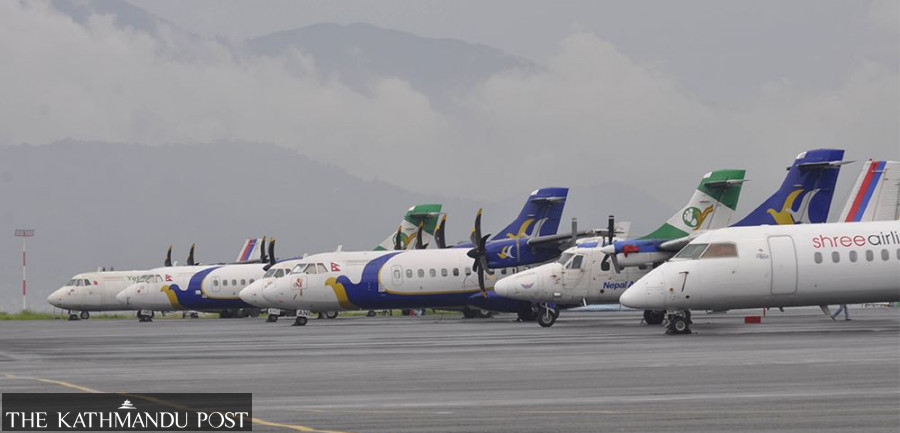Money
Domestic flyers ‘may be exempted’ from antigen test
On Tuesday, a meeting at the Home Ministry concluded that rapid antigen tests for travellers boarding domestic airlines doesn’t look practical.
Sangam Prasain
The government may exempt domestic flyers from the mandatory rapid antigen tests requirement that it had introduced last Friday.
The move follows the request from the domestic airline companies.
As per the Cabinet’s decision, domestic airlines should do a mandatory antigen test of travellers and allow them to travel only if they test negative. The airline company will bear the cost of the antigen test, the decision said.
Buddhi Sagar Lamichhane, joint secretary at the Tourism Ministry, said that the issue to exempt flyers in the domestic airlines from the antigen tests requirement was “under consideration”.
On Tuesday, a meeting led by Home Minister Bal Krishna Khand, consisting of secretaries of Home, Health and Tourism ministries concluded that the requirement of antigen test does not look practical, said Lamichhane.
“The decision may come in the favour of domestic airlines tomorrow,” said Lamichhane, who heads the aviation affairs at the tourism ministry.
Fanindra Mani Pokhrel, a spokesperson at the Home Ministry, told the Post that as per the discussion, the Tourism Ministry will announce the official decision regarding the exemption based on the Health Ministry’s recommendation.
Domestic airlines say the mandatory requirement of rapid antigen tests for domestic airlines passengers is a harsh rule.
“Testing all passengers would be difficult,” said Dipendra Karna, communication manager of Buddha Air. "Imposing such a burden on the already financially burdened airline industry has the potential for severe unintended consequences.”
Airline companies say testing flyers in remote airports is more difficult.
Officials at the Civil Aviation Authority of Nepal, the regulator, too, said the new rule was impractical.
“What’s the provision if there is a rescue or emergency flights?” an official at the regulatory body questioned.
According to airline officials, in winter, most domestic flights get cancelled. “Do the passengers need to repeat the test on their rescheduled flight?”
It takes 20-25 minutes for an antigen test. If there are 72 passengers in a flight, it will require a lot of time and manpower too, according to an airline official.
The government has said that the airline company needs to bear the cost of the antigen test. The test kit for antigen alone costs around Rs500 to Rs700.
“The airlines are at another stage of the pandemic now. We just can’t go around and make everything free,” said Karna.
“There are many issues. The decision was made without proper consultation,” said the official at the regulatory body.
The government has also made it compulsory for people to produce proof of full vaccination to use public services from Friday. This also includes boarding domestic flights.
Airlines Operators Association of Nepal, a private sector body representing 15 airline companies, has welcomed the rule to produce proof of full vaccination but said testing all passengers was impractical.
The association on Wednesday issued a new travel protocol for its member airlines.
Airlines need to disinfect aircraft and passengers luggage against the coronavirus.
The government on Sunday implemented a slew of restrictions to prevent the spread of Covid-19 as the third wave has hit the country.
The airlines initially were against the mandatory requirement of vaccination cards as well.
But the Health Ministry said any exemption would be suicidal.
“There won't be any excuse,” Dr Samir Adhikari, deputy spokesperson for the ministry, told the Post recently. “From January 21, if you don’t possess the vaccine card, you won’t be allowed to enter public places. This is mandatory for air travellers also. It’s a life-saving initiative that we have taken.”
According to Adhikari, the announcement of the mandatory requirement of vaccination cards has increased the number of people coming for vaccines.
According to the Health Ministry, 41 percent of the 30 million people have been fully vaccinated as of Wednesday.
Nepal on Wednesday reported 11,352 new coronavirus cases in the last 24 hours. The nationwide active cases stand at 47,929.
On January 9, the Covid-19 Crisis Management Coordination Centre (CCMCC) decided to recommend mandatory vaccination cards to enter public places from January 17.
Public places, according to the Home Ministry, include offices, hotels, restaurants, cinema halls, stadiums, airports and parks, among others.
However, the implementation date was pushed back to January 21.
In 2021, a horde of 3.54 million domestic fliers braved Covid restrictions and took to the skies, the highest number of air travellers recorded in the history of Nepali aviation.
According to Tribhuvan International Airport statistics, domestic air passenger numbers were up a sharp 11.08 percent from pre-Covid 2019 levels, as airlines dangled cheap tickets to attract travellers.
There are 20 airline companies in Nepal, including 10 fixed-wing operators.
The statistics show that the popularity of plane travel took off in 2021 after a disastrous 2020.
Domestic passenger traffic at Kathmandu’s Tribhuvan International Airport had fallen to its lowest level in 2020 since 2009.
Domestic airlines carried 1.45 million passengers in 2020, a 54.28 percent plunge from the 2019 figure.




 20.12°C Kathmandu
20.12°C Kathmandu














